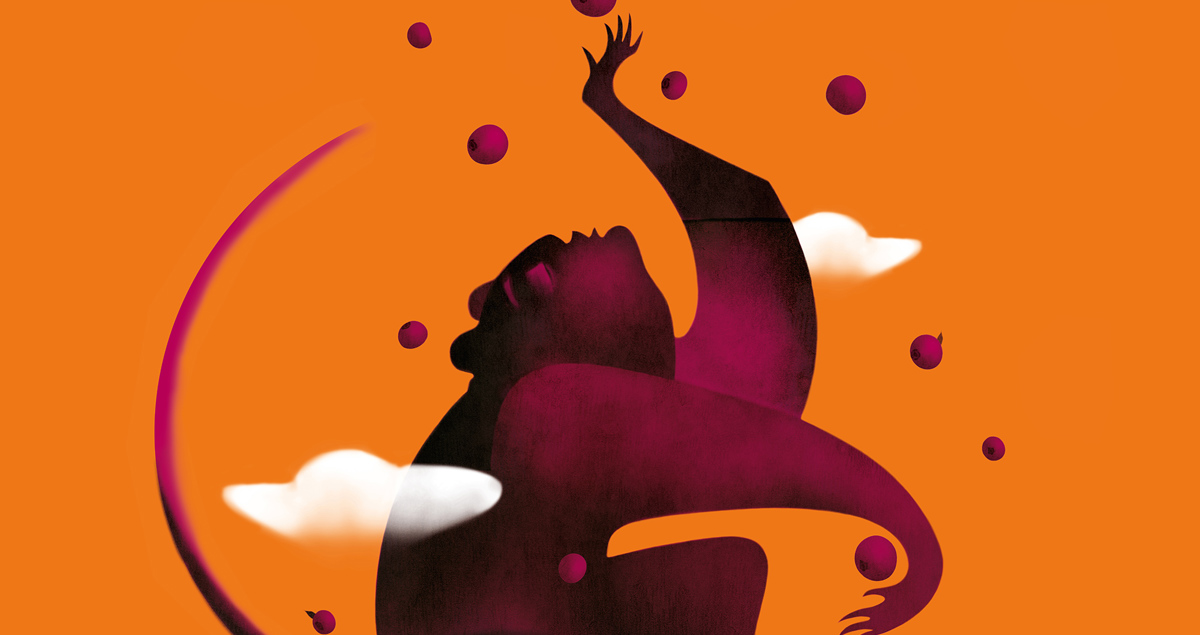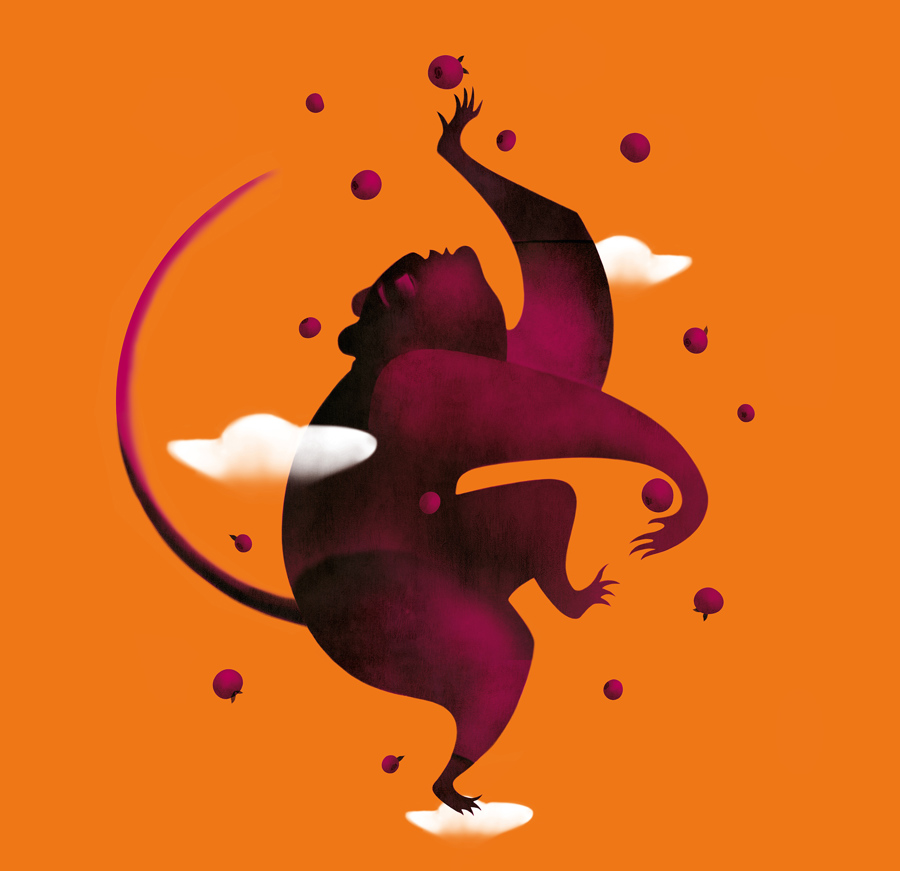
Heidelberg
Lundi dernier, une prise de bec sur les médias sociaux à propos de l’étymologie du nom d’une ville a brièvement fait grimper en flèche le niveau linguistique du discours haineux en ligne.
Comme c’est souvent le cas, tout a commencé avec une photo de nourriture somme toute innocente. L’influenceuse appelée @loving_heidelberg_life, connue pour les mots-clics #bigbarrels, #romanticheidelberg et #highhellsoncobblestones, a téléversé la photo d’un bol en poterie qu’elle avait elle-même conçu, rempli de bleuets biologiques, agrémentée d’un jeu de mots sans prétention sur leur nom allemand : « Les Heidelbeeren comme les Heidelbergers : en santé, antitoxiques et la plupart du temps bien juteux », a-t-elle informé ses 159 245 abonné.e.s, en ajoutant un émoji de clin d’œil et le mot-clic #whatsinaname.
« Euh… quoi ? a commenté @karzerstudentin. Décidément, ça va trop loin ces niaiseries d’industrie du bien-être. Le mot Heidelberg n’a rien à voir avec “Heidelbeere” – vérifie tes sources. » Un essaim en colère de superfans autoproclamé.e.s de #heidelbergies (amateur.e.s de la ville comme du fruit, ce dernier faisant bonne figure sur leurs photos de profil) n’a pas tardé à submerger le fil de commentaires de cette réponse. Les liens se sont succédé vers le logo officiel de la ville d’Heidelberg, dont la couleur est définie comme « bleu bleuet ». Preuve à l’appui, comme on dit.
« Peut-être, oui, mais par ici, on les appelle “Blaubeeren”, de toute manière », a rétorqué @karzerstudentin. Afin de clore le débat, elle a suggéré une sorte d’enquête compétitive, qui viendrait prouver hors de tout doute que les baies en question ne poussent même pas dans les parages. S’en est suivi un déferlement de photos de bleuets sauvages supposément cueillis sur la Königsstuhl – ou « Chaise du roi », la montagne d’Heidelberg – dont certains étaient encore dans leur emballage de la marque Aldi.
Le simple fait de mentionner la Königsstuhl en a incité certain.e.s à demander pourquoi la ville s’appelait Heidelberg, et pas la montagne (Berg). « Parce que le nom de la ville vient du château et non de la montagne, nono. » Peu après, la réplique « Depuis quand on traite quelqu’un de nono quand on a plus que trois ans ? » a inspiré la communauté à trouver toute une série d’épithètes, allant de « baril de jus » à « junkie de château », en passant par « amant des bleuets », ce qui a ramené la discussion à son point de départ. Quelqu’un a suggéré de rebaptiser la ville Königsstuhl, comme ça aucune explication ne serait nécessaire, sans parler du fait que le nom est beaucoup plus cool. Les #heidelbergies ont contre-attaqué, accusant les autres de les insulter : « On le voit, vous savez, le petit “STOOL” à la fin. »
Un tsunami d’injures a ensuite déferlé sur @heidelberger111, qui avait prétendu que la ville était nommée en hommage à l’ours d’Heidel, qui avait l’habitude de vivre dans les forêts avoisinantes et avait été immortalisé en bronze à l’extrémité du vieux pont. « C’est un singe, vieux ponpon !!! »
C’est alors que @philosopherswalk s’est plaint du nivellement par le bas des arguments et contre-arguments linguistiques : pour l’amour du ciel, Heidelberg était tout de même une cité universitaire qui avait inspiré de grandes œuvres littéraires. Le fleuve Mississippi, dans le roman de Mark Twain Les aventures d’Huckleberry Finn, n’était-il pas en réalité le Neckar ? Et huckleberry n’était-il pas l’autre nom de la bilberry, prouvant que le protagoniste avait été nommé d’après la ville ? Quelqu’un l’a aussitôt traité de téteux et d’escroc snobinard, ou plus précisément, d’« Anna Delvey de la référence littéraire ». Le principal intéressé s’est mis à citer des poèmes de Brentano. Un de ses abonné.e.s a partagé les paroles de la chanson I lost my heart in Heidelberg. Un autre a avancé qu’Heidi était en fait un diminutif d’Heidelberg, et que la fillette des Alpes était donc nommée en l’honneur de la ville et de son mignon château en ruines, un commentaire rapidement supprimé après l’intervention d’avocats suisses spécialistes du droit d’auteur. Dans le même esprit, une référence à Homo heidelbergensis a brièvement et malencontreusement été la cible d’un modérateur virtuel affirmant que la nétiquette de la communauté n’avait pas été respectée. Des excuses n’ont pas tardé à survenir.
Lorsque les théories du complot ont émergé à propos du vol Lufthansa A320-200 qui se serait écrasé sur une île de l’Antarctique, @loving_heidelberg_life a mis fin au débat grâce à la mise en ligne d’une vidéoconfession dans laquelle elle avouait à ses abonné.e.s n’avoir jamais mis les pieds à Heidelberg de sa vie.
Julia von Lucadou

Ein etymologischer Shitstorm um einen Städtenamen hat am Montag das sprachliche Level der Hasskommentare im Internet für kurze Zeit angehoben.
Wie so oft auf Social Media, begann alles mit einem unschuldigen Essens-Foto. Influencerin @loving_heidelberg_life, berühmt für #großeFässer, #Romantik und #HighheelsAufKopfsteinpflaster, postete für ihre 159.245 Follower das Bild einer selbstgetöpferten Schale voller Bio-Heidelbeeren. „Gesund, antitoxisch und meistens blau - genau wie die Heidelberger“, schrieb sie mit einem Zwinker-Emoji, sowie dem Hashtag LIEBLINGSNAME.
„Äh was?", kommentierte @karzerstudentin, „jetzt geht es aber zu weit mit dem Wellnessquatsch. Das Wort Heidelberg hat mit der Heidelbeere rein gar nichts zu tun, überprüf mal deine Quellen.“ Ein Schwarm selbsternannter #Heidelbergies, Superfans der Stadt und des Obstes gleichermaßen, bekannt für ihre Heidelbeer-Profilfotos, flutete daraufhin wütend die Kommentarspalte. Sie verlinkten auf das offizielle Heidelberg-Logo, dessen Farbe als „heidelbeer“ angegeben ist. Das sei ja wohl eindeutig.
„Im einheimischen Dialekt sagt man Blaubeere, nicht Heidelbeere, ihr Ökos“, war die Antwort der @karzerstudentin. Sie könnten die Debatte auch einfach mit einem Blaubeerensammelwettbewerb klären, die Früchte gäbe es in der Gegend nämlich sowieso nicht.
Es folgten eine Reihe Uploads von angeblich am Heidelberger Hausberg „Königstuhl“ gesammelten Heidelbeeren, einige davon noch in Aldi-Plastikschale.
Die Erwähnung des Königstuhls brachte die Frage auf, wenn der Berg gar nicht Heidelberg heiße, warum dann die Stadt. „Weil der Name vom Schloss kommt und nicht vom Berg, Blödi.“ Auf die Gegenfrage, seit wann das Schimpfwort „Blödi“ von über Dreijährigen verwendet würde, entwickelte die Community eine Reihe alternativer Schimpfwortvorschläge, darunter „Saftfass“, „Schloss-Junkie“ und „Heidelbeer-Lover“, was wieder zur Ursprungsdebatte zurückführte. Jemand schlug vor, die Stadt einfach in Königstuhl umzutaufen, das sei weniger erklärungsbedürftig und sowieso viel cooler. Die #Heidelbergies wehrten sich mit dem Vorwurf der Beleidigung, „weil der Stuhl das Ding ist, wo man den Hintern absetzt.“
Eine wahre Beleidigungsfontäne traf @Heidelberger111, der meinte, die Stadt sei nach dem Heidel-Bär benannt, der im Stadtwald lebe. Von dem gäbe es deshalb die Bronzestatue am Brückenkopf. „Das ist ein Affe, du alte Brücke!!!“
@philosphenwegbereiter beschwerte sich an diesem Punkt über das linguistische Level der Debatte, Heidelberg sei verdammt nochmal eine Universitätsstadt und berühmte Inspiration der Hochliteratur. Der Mississippi in Mark Twains "Die Abenteuer des Huckleberry Finn" zum Beispiel sei in Wirklichkeit der Neckar und der Protagonist nach der Stadt benannt. Jemand schimpfte ihn einen hochnäsigen Hochstapler, „die Anna Delvey der Literaturreferenzen“. @philosphenwegbereiter begann, Brentano-Gedichte hochzuladen. Eine Followerin postete „Ich hab mein Herz in Heidelberg verloren“. Eine weitere behauptete, „Heidi“ sei eine Kurzform von Heidelberg und das Schweizer Bergkind ein Tribut an die Stadt mit der niedlichen Schlossruine. Der Kommentar wurde durch Schweizer Copyrightanwälte (werhatserfunden.ch) sofort entfernt. Auch die Erwähnung des Homo heidelbergensis wurde aus Versehen kurzzeitig von einer künstlich intelligenten Moderator*in wegen Verletzung der Community-Richtlinien gelöscht, wofür man sich später entschuldigte.
Als sich Verschwörungstheorien um eine Lufthansamaschine des Typs A320-200 und ihren angeblichen Absturz auf einer Insel in der Antarktis entwickelten, beendete @loving_heidelberg_life die Debatte mit einem tränenreichen Confessional-Video, in dem sie ihrer Followerschaft beichtete, sie sei noch nie in Heidelberg gewesen.
Julia von Lucadou
Last Monday, a social media row over the etymology of a city’s name briefly spiked a rise in online hate speech.
As is often the case, it all began with an innocent photo of food. The influencer @loving_heidelberg_life, known for her hashtags #bigbarrels, #romanticheidelberg and #highheelsoncobblestones, posted a photo of a pottery dish she had personally hand-thrown, filled with organic blueberries, along with a minor pun on their German name: “Heidelbeeren are like Heidelbergers: healthy, nontoxic and usually juiced up,” she informed her 159,245 followers, adding a winking emoji and the hashtag #whatsinaname.
“Uh… what?” commented @karzerstudentin. “This wellness nonsense has really gone too far now. The name ‘Heidelberg’ has nothing to do with ‘Heidelbeere’ – check your sources.” An angry swarm of self-proclaimed #heidelbergies (superfans of both the city and the fruit, which features prominently in their profile photos) promptly flooded the comments section. They posted links to the official city of Heidelberg logo, whose colour is listed as “blueberry.” Proof positive.
“That may be, but around here we call them ‘Blaubeeren’ anyway,” retorted @karzerstudentin. To settle the debate, she suggested a foraging competition to prove that the berries in question don’t even grow in the area. This was followed by a flurry of photos of wild European blueberries that had supposedly been picked on the Königsstuhl – the “King’s Chair,” nicknamed Heidelberg’s local mountain – including some that were still in Aldi-branded plastic packaging.
The mere mention of the Königsstuhl prompted some people to ask why the city was called Heidelberg if the mountain (Berg) wasn’t. “Because the city’s name comes from the castle, not the mountain, dummy.” Which was quickly followed by, “Since when does anyone over the age of three call anyone else a dummy?” This interaction inspired the community to suggest a whole host of epithets ranging from “juice barrel” to “castle junkie” and “blueberry lover,” which brought things full circle to the original dispute. Somebody suggested renaming the city Königsstuhl because it would need less explaining and was a way cooler name. The #Heidelbergies fought back, accusing others of insulting them. “We know what you’re getting at with the STOOL at the end.”
Insults flooded @heidelberger111’s account, after they claimed that the town was named after the Heidel bear that used to live in the local forest and had a bronze statue erected in its honour at the end of the famous “Old Bridge”. “That’s a monkey, and YOU’RE an old bridge!!!”
At this point, @philosopherswalk complained about how low the linguistic level had sunk; Heidelberg was still a university city, for heaven’s sake, and had famously inspired a great work of literature. Wasn’t the Mississippi River in Mark Twain’s The Adventures of Huckleberry Finn actually the Neckar? And wasn’t huckleberry just another word for “blueberry,” proving his protagonist had been named after the city? Somebody immediately called him a stuck-up, highbrow fraud, “the Anna Delvey of literary references.” In response, @philosopherswalk began to quote Brentano poems. One of his followers posted “I lost my heart in Heidelberg.” Another claimed that “Heidi” was actually short for Heidelberg and that the girl from the Alps was named after the city and its adorable ruined castle. This comment was swiftly deleted once Swiss copyright lawyers got wind of it. Similarly, a reference to Homo heidelbergensis was briefly and mistakenly flagged by an AI moderator for breaching community guidelines, resulting in a later apology.
When conspiracy theories emerged surrounding the Lufthansa A320-200 flight that supposedly crashed on an island in the Antarctic, @loving_heidelberg_life put an end to the debate with a tearful video confession in which she admitted to her followers that she had never been to Heidelberg in her life.
Julia von Lucadou
Artistes
Julia von Lucadou, autrice (site anglais, site allemand)
Stella Dreis, illustratrice (site, Facebook, Instagram)
Rachel Ward, traductrice
